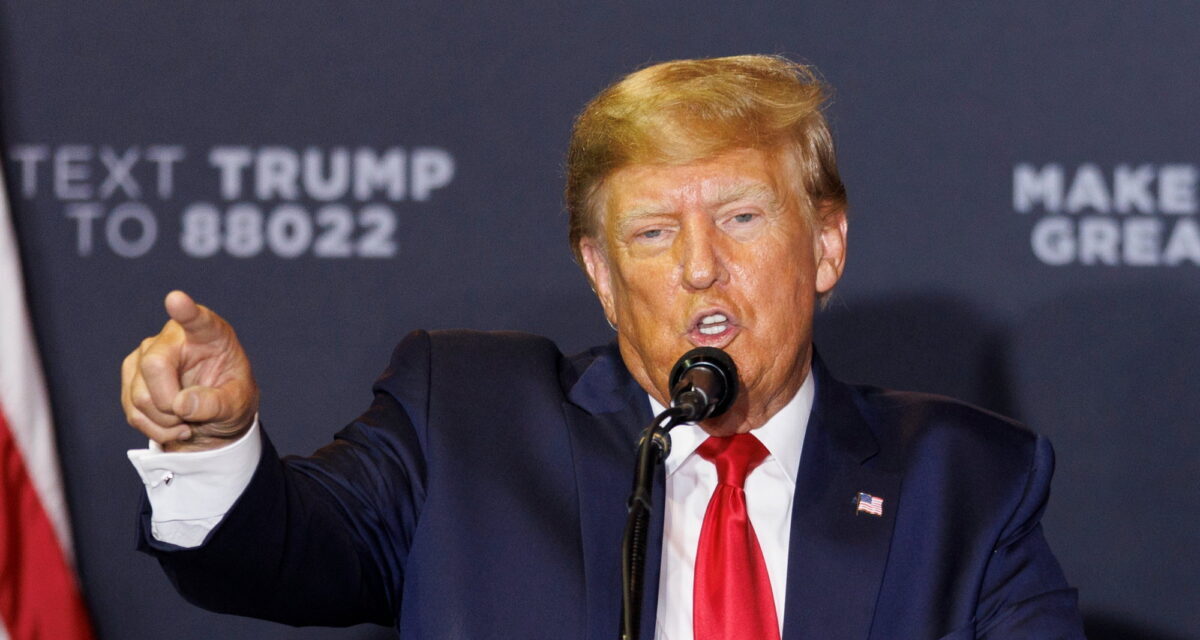The British public service media BBC recently wrote that "a long-term legal motion to disqualify and remove Donald Trump from the 2024 US presidential election is gaining popularity." He also reported that a Washington-based watchdog group sued Trump to block him from competing in the Republican primary in Colorado — likely the first of several such lawsuits likely to wind up in the conservative-dominated federal Supreme Court, Jr. writes. Constitutional lawyer Zoltán Lomnici in the latest post of the Basic Law blog .
The British public service media BBC recently wrote that "a long-term legal motion to disqualify and remove Donald Trump from the 2024 US presidential election is gaining popularity." He also reported that a Washington-based watchdog group had sued Trump to block him from competing in the Republican primary in Colorado — likely the first of several such lawsuits likely to end up in the conservative-dominated federal Supreme Court. The disqualification strategy in the primaries invokes a rarely used provision of the US Constitution - the Third Section of the 14th Amendment - which bars those who have "engaged in rebellion or sedition" against the country from holding federal office.
The 14th Amendment was ratified after the Civil War and Section 3 was deployed to prevent secessionists from returning to former government positions after Southern states rejoined the Union. It was used against such figures as Confederate President Jefferson Davis and his Vice President Alexander Stephens, both of whom were members of Congress, but has rarely been invoked since.
The effort is being spearheaded by Free Speech For People, a self-described nonpartisan advocacy group that last year objected to Trump-backed lawmakers it called "rebels." The 14th Amendment was written not only for the post-Civil War era, but also for future uprisings, argues Ron Fein, the organization's legal director. Of course, it must be taken into account that this argument also supports the revival of a series of rarely used legal norms (Logan Law).
The background of the cases is that, in addition to the series of indictments, the possibility that Donald Trump would be excluded from the political race . Since the historical and grammatical interpretation of the 14th amendment to the Constitution cannot meet the former, anti-democratic wish, several recognized legal authorities have publicly voiced their objections in this regard.
The 14th constitutional amendment
The Fourteenth Amendment to the Constitution, , was created during the reconstruction period following the Civil War, was adopted by the legislature on June 13, 1866, and entered into force on July 9, 1868. Its purpose was to settle the situation of ex-slaves living in the southern states and former officials of the Confederacy.
Section 1 states that anyone born within the United States is automatically a citizen of the United States and of the state in which they live. The original purpose of this was to grant civil rights to former slaves, but its effect to this day is to grant citizenship to the children of foreign parents born in America. The first section also states that the states are obliged to grant and protect the rights of their citizens that are guaranteed to them by the federal constitution. The relevant section also obliges states to ensure equality before the law for their citizens (including former slaves). The third, relevant section, restricts the right of former officers of the Confederacy to hold federal office. According to this section, a person who once took an oath of office to defend the Constitution of the United States and later participated in insurrection or rebellion, or aided or abetted the enemies of the United States, cannot hold office in the federal government. If necessary, the Congress can grant an exemption from this restriction by a two-thirds majority.
Review by Alan Dershowitz
According to the legendary lawyer and law professor Alan Dershowitz, the ideas advocating the impeachment of Trump are based on the twist that a person who "participated in an insurrection or rebellion" cannot hold public office. In this context, Dershowitz emphasizes that, on the one hand, the amendment does not provide guidance ("mechanism") as to whether the cited disqualifying reason can apply to a candidate at all. On the other hand, the said section does not authorize any body or person to impose such disqualification. (It only states that Congress can, if necessary, grant an exemption from this restriction by a two-thirds majority.)
According to the professor, a grammatical and historical interpretation of the 14th Amendment makes it clear that the exclusion provision was intended to apply to persons who served the Confederacy during the Civil War, not as a general provision authorizing one party to excludes the party's leading candidate from future elections. "The provisions were intended to apply to a certain insurrection and rebellion, namely, civil war." This is confirmed by the language of section 4 of the amendment. Furthermore, the lack of a mechanism, procedure, or criteria for determining a candidate's disqualification shows that the amendment did not establish a general rule for future elections involving candidates who were not members of the Confederacy.
It is also hypocrisy and a complete misinterpretation of the law, according to him, the frequent argument that, despite the above, the exclusion clause should be interpreted broadly (that is, it applies to all elections, to all candidates), while the equal protection clause of the 14th amendment should be interpreted narrowly (that is, the it only protects formerly enslaved people and their descendants). While the exclusion clause is obviously time-bound in light of what has gone before, the wording of the equal protection clause: "no state may deny […] to any person under its jurisdiction the equal protection of the laws" strongly suggests a general application.
If we were to interpret this post-civil war amendment (exclusion clause) as a general provision that excludes candidates who, according to some, participated in an event they consider a rebellion or insurrection (e.g. even a demonstration), then we would create another political weapon in the increasingly partisan American public life.
According to Dershowitz, the United States Constitution imposes narrow eligibility criteria for the person of the president precisely so that beyond these criteria, the decision can be made by the voters themselves, who can freely consider the activities of each candidate. And the vague wording of the 14th amendment falls far short of what would be necessary in a constitutional democracy for such a radical change of the electoral procedure. All in all, then, under these conditions, it is quite certain that a constitutional crisis would occur if Trump were excluded from the democratic race by some person or institution controlled by the Democrats.
American law professor Michael McConnell's opinion on possible exclusion of Trump from electoral processes in connection with the 14th amendment
Stanford Law School constitutional law professor McConnell , Trump's exclusion from the election race would be extreme, divisive and anti-democratic, because in his opinion, Section 3 of the 14th Amendment should be interpreted as narrowly as possible in order to allow "American citizens to vote for the candidates of their choice."
"We must not forget that - in relation to this issue - we are talking about empowering party politicians to exclude their political opponents from the electoral process, depriving voters of the right to free choice. […] This is profoundly anti-democratic,” McConnell begins. The professor cites Reynolds v. Sims, 377 US 533, 555 (1964), in which it was stated that: "the essence of a democratic society is that the individual should be free to vote for the candidate of his choice, and any limitation of this right violates the essence of representative government."
According to McConnell, in terms of the degree of violence, there is a huge difference between civil movements and rebellions and uprisings, which is why their definitions must be distinguished. This kind of blurring of concepts, as well as equating active participation as perpetrating behavior with "indirect support", as well as the lack of mechanisms also mentioned by Dershowitz, would provide politicians with the opportunity to request the exclusion of their opponents at any time. All of this would go against not only precedent, but also history. McConnell points out that it is also significant that authorities have charged hundreds of people for their involvement in the January 6 break-in at the Capitol, but no one, including Trump, has been charged with sedition under this or any other law. .
If responsible, competent officials with clear legal and constitutional authority did not do this, it is not clear on what basis party politicians with uncertain definitions and without authority could decide who should run in the elections of a democratic state.
"We must allow the American people to vote for the candidates of their choice!" - concludes the professor.
Cover image: MTI/EPA/CJ Gunther












